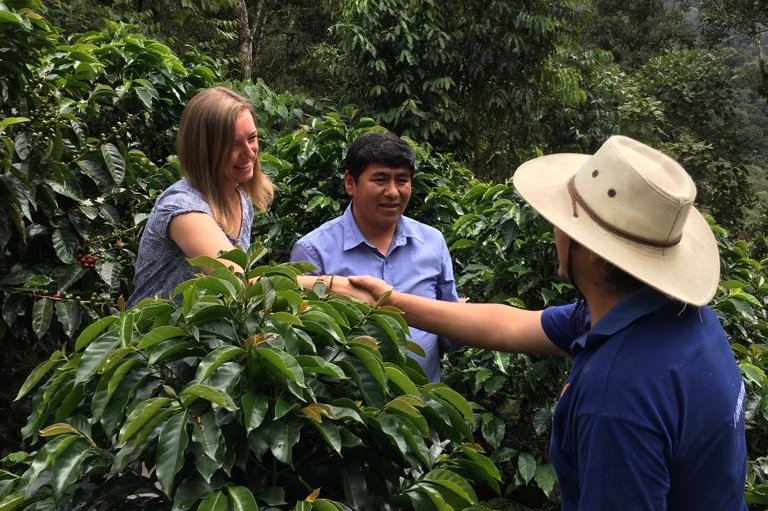The pilot initiative is part of the Glasgow-based coffee roaster’s goal to achieve net zero by 2040 and will provide greater visibility of supply chain emissions and environmental impact

Matthew Algie Sustainability Manager Amy Oroko visiting a coffee producer in Honduras | Photo credit: Matthew Algie
Glasgow-based Matthew Algie has launched a two-year pilot sustainability project in Honduras that could serve as a blueprint to decarbonise its global supply chain.
The £50,000 ($61,600) Net Zero Supply Chains Pilot Project will see the 160-year-old coffee roaster work with coffee farmers in the Latin American country to reduce carbon emissions. It will also help producers measure their carbon footprint, protect forests, and improve gender equality across their operations.
Data has so far been collected from 100 Honduran coffee producers, which will enable Matthew Algie to move away from estimates and more accurately identify emissions hotspots.
Scope 3 supply chain emissions currently account for more than 90% of Matthew Algie’s total carbon footprint. In a press release, the Scottish coffee roaster said it will monitor the progress of the project in Honduras with a longer-term goal of rolling out the initiative to other coffee producing countries, including Brazil, Uganda, Vietnam, Indonesia, Peru, India and Tanzania.
“Decarbonising the supply chain is probably the biggest challenge in any industry and organisation’s journey toward Net Zero, and this project is a crucial step in our ambitions to achieve it by 2040. We are studying the impact of the measures we introduce, and the support required, and from there we will be able to formulate plans that will enable other cooperatives in Honduras and other coffee supplying nations to make their operations more sustainable,” said Amy Oroko, Project Lead and Sustainability Manager at Matthew Algie.
The Net Zero Supply Chains Pilot Project has been launched in partnership with Utrecht-based international trade non-profit Solidaridad Network, which works with 120,000 coffee farmers in 11 countries across South America and East Africa.
The project is one of several initiatives implemented by Matthew Algie as part of its net zero 2040 goal. In September 2024, the sustainability-focused coffee roaster unveiled a major coffee factory upgrade with a focus on efficiency and eco-friendly production and has recently began transitioning to recyclable retail coffee packaging and larger one-ton bags for green coffee shipping.
Founded in 1864, Matthew Algie supplies coffee, machines, equipment and training to more than 7,500 UK hospitality businesses. Part of German coffee giant Tchibo Group since 2016, approximately 90% of Matthew Algie’s green coffee comes from Fairtrade co-operatives. The Glasgow-based coffee roaster introduced the UK’s first Fairtrade espresso in 1997 and the world’s first triple-certified (Fairtrade, Organic and Rainforest Alliance) espresso in 2004.